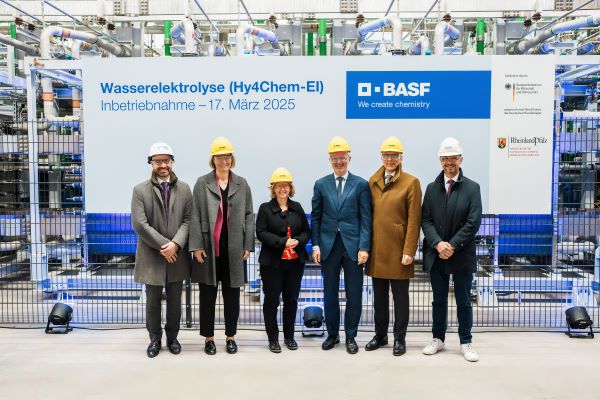Direct integration of the technology into a chemical production environment is a world first

L-R: Manuel Mundt, Vice President Finance Sustainable Energy Systems at Siemens Energy, Katja Scharpwinkel, member of BASF SE’s Board of Executive Directors and Site Director Ludwigshafen, Katrin Eder, Rhineland-Palatinate’s State Minister for Climate Protection, Environment, Energy, and Mobility, Udo Philipp, State Secretary at the Federal Ministry for Economic Affairs and Climate Action, Stephan Kothrade, member of BASF SE’s Board of Executive Directors and Chief Technology Officer and Christoph Schuette, Managing Director at Siemens Energy Germany. Photo: BASF SE
Germany’s largest proton exchange membrane (PEM) electrolyzer has gone into operation at BASF’s Ludwigshafen site. Designed to produce zero-carbon hydrogen, the electrolyzer has a connected load of 54 megawatts and the capacity to supply the main plant with up to one metric ton of this substantial chemical feedstock every hour.
After a construction period of around two years, the plant was officially inaugurated in the presence of the Rhineland-Palatinate State Minister for Climate Protection, Environment, Energy, and Mobility Katrin Eder, and Udo Philipp, State Secretary at the German Federal Ministry for Economic Affairs and Climate Action.
Built in cooperation with Siemens Energy, the water electrolyzer is embedded in the production and infrastructure at the Ludwigshafen site, making it truly unique in terms of its interface and integration into a chemical production environment. A total of 72 stacks – modules in which the actual electrolysis process takes place – have been installed in the system. The electrolyzer has the potential to reduce greenhouse gas emissions at BASF’s main plant by up to 72,000 metric tons per year.
The emission-free production of hydrogen – using electricity from renewable sources – is fundamental to the market ramp-up of chemical products with a reduced carbon footprint. Once produced, the hydrogen is fed into the site’s hydrogen Verbund network and distributed to the production facilities as a raw material. In addition to using it as a feedstock for chemical products, BASF plans to supply hydrogen for mobility in the Rhine-Neckar Metropolitan Region, supporting the development of a hydrogen economy in the area.
In cooperation with the State of Rhineland-Palatinate, the German Federal Ministry for Economic Affairs and Climate Action provided funding of up to €124.3 million for the construction of the plant – €37.3 million of which was financed by the government of Rhineland-Palatinate. BASF’s investment in the project amounts to around €25 million. The project, entitled Hy4CHem, was selected as part of the IPCEI Hydrogen expression of interest procedure and subsequently funded as an individual project.
Katja Scharpwinkel, member of BASF SE’s Board of Executive Directors and Site Director Ludwigshafen, said: “The commissioning of the electrolyzer makes it possible for us to support our customers in achieving their climate targets by offering them products with a lower carbon footprint. At the same time, we are gaining experience at our largest Verbund site with the integration and operation of a system that brings us another step closer to transforming our main plant in Ludwigshafen. We welcome the fact that the federal government and state government have recognized the importance of this technology and provided us with significant support toward the project’s implementation.”
Subscribe to our newsletter & stay updated.